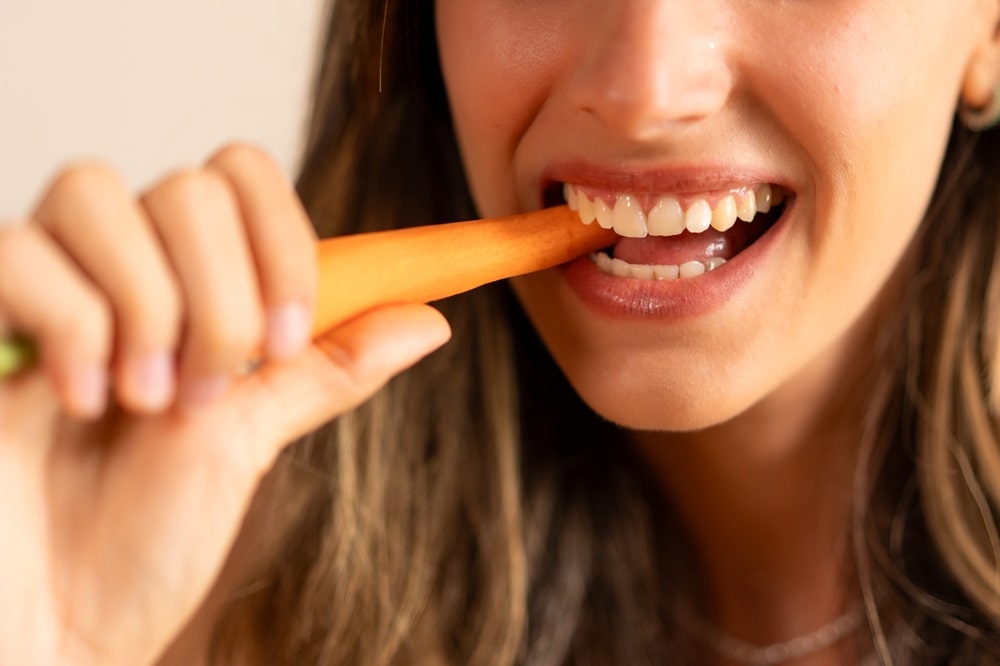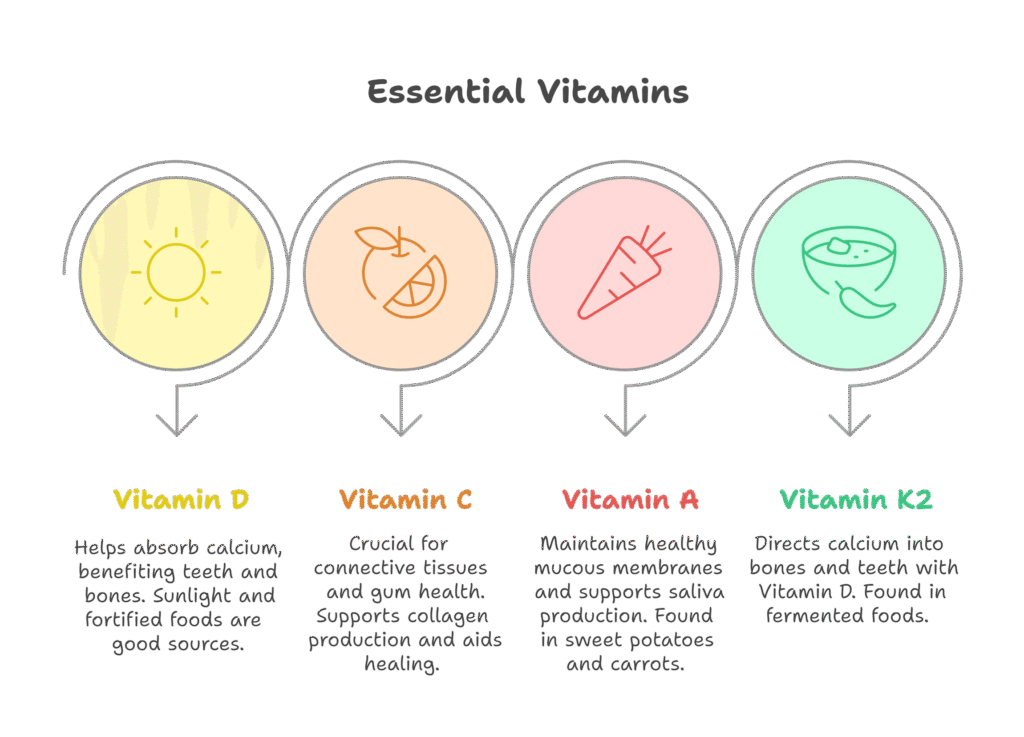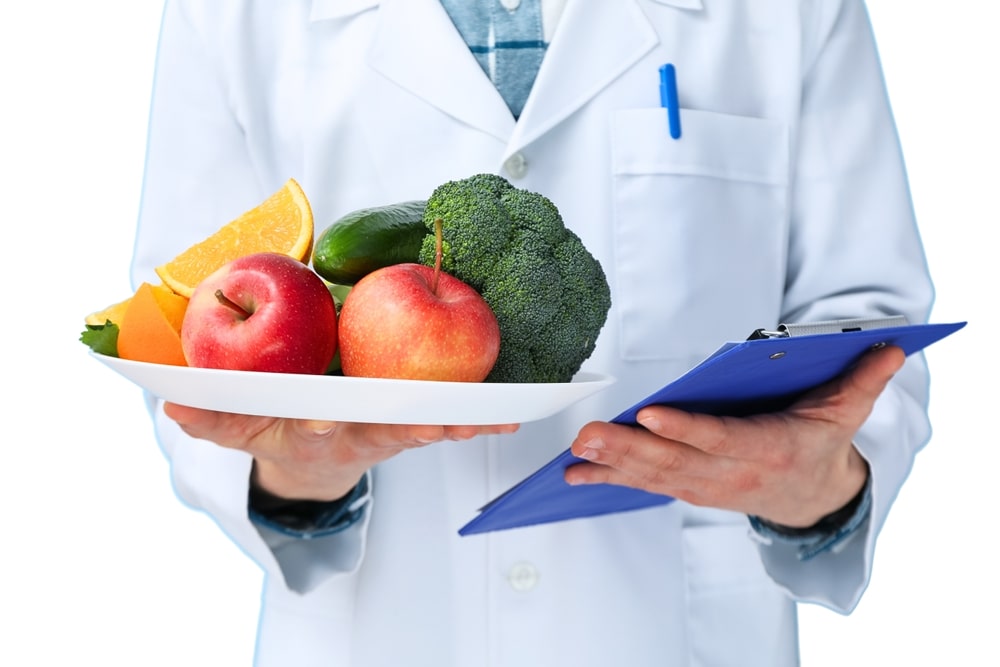Your smile is often the first thing people notice, and maintaining its health goes far beyond brushing and flossing. What you eat and drink plays a profoundly significant role in the strength of your teeth and the health of your gums. At Smile Makers Dental Care in Brampton, we understand that optimal oral health is a cornerstone of overall well-being. While regular check-ups and good hygiene habits are crucial, understanding the connection between your diet and your smile is a powerful tool in preventing cavities, gum disease, and other oral health issues.
This guide explores how the foods you choose can either help protect or harm your oral health, highlighting the nutrients that matter most and offering practical tips for incorporating a tooth-friendly diet into your daily life.
How What You Eat Shapes Your Oral Health
The mouth is a complex ecosystem. Every time you eat or drink, food particles and sugars interact with the bacteria in your mouth. Certain bacteria feed on sugars and starches, producing acids as a byproduct.
These acids are the primary culprits behind tooth decay, attacking and weakening the enamel – the protective outer layer of your teeth.

Over time, this acidic attack can lead to cavities. Beyond decay, diet also impacts gum health.
Inflammation caused by plaque buildup (a sticky film of bacteria) is exacerbated by poor nutrition, increasing the risk of gingivitis and more severe periodontal disease.
Conversely, a nutrient-rich diet helps support the body’s immune response and strengthens the tissues in your mouth, making them more resilient against infection and inflammation.
Furthermore, the physical act of chewing certain foods stimulates saliva production.
Saliva is your mouth’s natural defense system; it helps wash away food particles, neutralizes harmful acids, and contains minerals like calcium and phosphate that help repair early enamel damage through a process called remineralization.
The Best Foods for Strong Teeth and Healthy Gums
Focusing on nutrient-dense foods can significantly benefit your oral health.
Incorporating these into your diet supports strong enamel, healthy gums, and a balanced oral environment:

- Dairy Products: Milk, cheese, and yogurt are excellent sources of calcium and phosphorus, essential minerals for strengthening and repairing tooth enamel and bone. Cheese, in particular, has been shown to help neutralize acids in the mouth after eating, reducing the risk of decay.
- Crunchy Fruits and Vegetables: Apples, carrots, celery, and bell peppers are not only packed with vitamins but their crunchy texture acts like a natural toothbrush, helping to scrub away plaque and food particles. Chewing them vigorously also stimulates saliva flow.
- Leafy Greens: Spinach, kale, and other leafy greens are rich in calcium, folic acid (a type of B vitamin vital for cell growth and repair), and other vitamins and minerals that support gum health.
- Lean Proteins: Foods like lean meats, poultry, fish, and eggs are good sources of phosphorus and protein, which are important for building and repairing oral tissues.
- Nuts and Seeds: Almonds, cashews, and sesame seeds provide calcium and phosphorus. Their texture can also help clean teeth, and chewing stimulates saliva.
- Fatty Fish: Salmon and other fatty fish are good sources of Vitamin D, which is crucial for the absorption of calcium, and omega-3 fatty acids, which may help reduce inflammation in the gums.
- Water: Drinking plenty of water, especially fluoridated water, is vital. Water helps rinse away food debris, keeps your mouth hydrated (supporting saliva production), and fluoride strengthens enamel.
- Green and Black Tea: These teas contain polyphenols, compounds that can help suppress the growth of bacteria that cause plaque and gum disease. Just remember to drink them unsweetened.
Key Nutrients for a Healthy Smile: Foods for Teeth
While a balanced diet provides a spectrum of nutrients, some are particularly critical for oral health:

- Calcium and Phosphorus: These minerals are the building blocks of tooth enamel and jawbone. Ensuring adequate intake helps maintain their strength and aids in the remineralization process that repairs early decay.
- Vitamin D: Essential for the body’s ability to absorb calcium. Without sufficient Vitamin D, even a calcium-rich diet won’t fully benefit your teeth and bones. Sunlight exposure and fortified foods are good sources.
- Vitamin C: Crucial for the health of connective tissues, including your gums. It supports collagen production, helps protect against gum disease, and aids in healing. Citrus fruits, berries, bell peppers, and broccoli are excellent sources.
- Vitamin A: Important for maintaining healthy mucous membranes, including the lining of your mouth, and for supporting saliva production. Found in foods like sweet potatoes, carrots, and spinach.
- Vitamin K2: Works with Vitamin D and Calcium to help direct calcium into bones and teeth. Found in fermented foods and some animal products.
Foods and Drinks to Abstain From
Just as certain foods help, others can significantly harm your oral health if consumed frequently or in excess:
- Sugary Foods and Drinks: Candies, cookies, cakes, sugary cereals, and sweetened beverages (soda, juice, sports drinks, sweetened teas/coffees) are the primary culprits. Bacteria in the mouth feast on these sugars, producing damaging acid. The more often your teeth are exposed to sugar, the higher the risk of decay.
- Acidic Foods and Drinks: Citrus fruits (lemons, limes, oranges) and highly acidic beverages (soda, sparkling water with citric acid, sports drinks, wine) can directly erode tooth enamel, weakening teeth over time, even if they don’t contain much sugar.
- Sticky Foods: Dried fruits, caramels, taffy, and even chips and crackers can cling to your teeth, keeping sugars and acids in contact with the enamel for extended periods.
- Starchy Foods: Foods like bread, pasta, and chips can get stuck in teeth and break down into simple sugars, feeding bacteria.
- Hard Candies and Ice: Chewing on hard substances can chip or crack teeth, potentially damaging existing restorations like fillings or crowns.
- Alcohol: Excessive alcohol consumption can dry out the mouth, reducing saliva flow and increasing the risk of tooth decay and gum disease.
Practical Dietary Tips for a Healthier Mouth
Integrating a tooth-friendly diet isn’t just about avoiding “bad” foods; it’s about smart choices:
- Timing Matters: If you consume sugary or acidic foods/drinks, try to do so with meals rather than between meals. Eating other foods helps stimulate saliva, which neutralizes acids and washes away particles.
- Rinse with Water: Swish your mouth thoroughly with plain water after consuming acidic or sugary items to help neutralize acids and rinse away residue.
- Chew Sugar-Free Gum: Chewing sugar-free gum stimulates saliva production and helps clean teeth after eating.
- Balance Your Plate: Ensure your meals include a mix of proteins, healthy fats, and complex carbohydrates to provide comprehensive nutrition for your whole body, including your mouth.
- Limit Snacking: Frequent snacking, especially on sugary or starchy foods, keeps your teeth constantly exposed to acid attacks. Try to stick to specific meal times.
Brampton Seasonal Foods
Eating with the seasons in Brampton makes shopping simple and fresh. It also helps you build naturally tooth-friendly meals year-round.
- Spring: Look for asparagus, rhubarb, and early greens. They’re crisp, fibre-rich, and great in simple salads.
- Summer: Load up on local strawberries, tomatoes, cucumbers, peppers, and sweet corn. They’re hydrating and packed with vitamins that support gum health. Visit the Brampton Farmers’ Market (June–Oct) for peak freshness.
- Fall: Apples, grapes, squash, and root veggies shine. Roast squash and beets for hearty sides that are gentle on teeth. Local orchards and farms around Peel make fall shopping easy.
- Winter: Ontario storage crops—carrots, potatoes, cabbage, onions—stay available. Use them in soups and stews for warm, balanced meals.
Tip: Plan shopping around what’s in season, then build meals with lean proteins and dairy for enamel-friendly calcium.
For weekend inspiration, browse the Grown in Peel guide and map to find nearby farms and markets. Small seasonal tweaks make eating well feel easy—and your smile benefits, too.
Tooth-Friendly Meal and Recipes
Incorporating beneficial foods into your daily meals can be simple and delicious. Think about meals that naturally combine tooth-friendly elements:

- Breakfast: Yogurt parfait with berries, chopped nuts, and a sprinkle of seeds. Or, scrambled eggs with spinach and a side of cheese.
- Lunch: Chicken or salmon salad served with crunchy carrots and celery sticks. A hearty soup with lean protein and vegetables.
- Dinner: Baked fish or lean poultry with steamed broccoli and a side of quinoa. Stir-fry with plenty of colourful vegetables and protein.
- Snacks: A handful of almonds, apple slices with cheese, carrot sticks, or plain yogurt.
Conclusion: Diet and Teeth Condition
The relationship between your diet and your oral health is undeniable. By making conscious choices about what you eat and drink, you provide your teeth and gums with the nutrients they need to stay strong and resilient. While a tooth-friendly diet is a powerful preventive measure, it is not a substitute for consistent brushing, flossing, and regular dental check-ups. At Smile Makers Dental Care, we believe in a comprehensive approach to your oral health. Understanding and implementing good dietary habits, combined with professional care and daily hygiene, is key to maintaining a healthy, beautiful smile for life.
If you have questions about your diet or need personalized advice, don’t hesitate to discuss it during your next appointment.
FAQs About Nutrition and Healthy Teeth and Gums
Q: Is fruit bad for my teeth because of the sugar?
A: While whole fruits contain natural sugars and can be acidic, they also provide water, fiber, and essential vitamins. The fiber helps stimulate saliva and clean teeth. Eating whole fruits in moderation and rinsing with water afterward is generally fine. Dried fruits, however, are much stickier and concentrated in sugar, making them less tooth-friendly. [Source: MouthHealthy.org]
Q: How quickly do sugary drinks damage teeth?
A: Every time you sip a sugary drink, your teeth are exposed to an acid attack that can last for up to 20 minutes or more. Frequent sipping prolongs this exposure, significantly increasing the risk of decay.
Q: Are sports drinks worse than soda?
A: Many sports drinks contain high levels of both sugar and acid, making them potentially just as damaging, if not more, than some sodas, especially with frequent consumption during activities. Water is almost always the best choice for hydration. [Source: Healthline.com]
Q: Can probiotics help my oral health?
A: Some research suggests that certain probiotic strains may help inhibit the growth of harmful bacteria in the mouth and potentially benefit gum health. However, more research is needed, and they should not replace traditional oral hygiene practices.
Q: What’s the best thing to drink besides water?
A: Plain milk (providing calcium and phosphorus), unsweetened tea, or plain water are generally the best choices for oral health. If you consume other beverages, do so in moderation and ideally with meals.
Q: Should I brush my teeth immediately after eating acidic foods?
A: No, it’s better to wait at least 30 minutes to an hour after consuming acidic foods or drinks before brushing. Acid softens tooth enamel, and brushing immediately afterward can wear away the softened enamel. Rinsing with water first is recommended.




